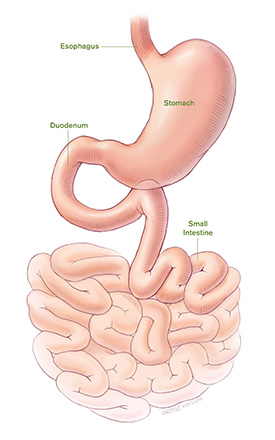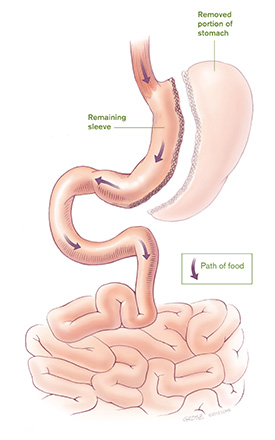Gastric Sleeve Surgery
Gastric Sleeve Surgery for Weight Loss
Gastric Sleeve is one of the weight loss surgeries provided by the highly skilled bariatric surgeons of Loyola Medicine. Gastric Sleeve, also known as Sleeve Surgery or Sleeve Gastrectomy, is used to help significantly overweight individuals attain a healthy weight.
Gastric Sleeve surgery makes your stomach smaller, so you feel full more quickly than usual. In order for Gastric Sleeve surgery to be successful, you must make lifelong changes in how you eat, including smaller portion sizes and different foods. Weight loss specialists at Loyola are committed to partnering with you to help you determine if Gastric Sleeve surgery is the right weight loss tool for your particular needs.
Benefits of Gastric Sleeve Surgery
Like most bariatric surgeries, Gastric Sleeve surgery is used for individuals who are significantly overweight and who have not been able to lose weight with diet and regular exercise. If you have a BMI (body mass index) of 40 or higher or have a BMI of 35 or higher coupled with weight-related medical conditions, you may be a candidate for Gastric Sleeve surgery.
If you and your Loyola surgeon determine that Gastric Sleeve surgery is right for you, Loyola’s multidisciplinary team of experts will partner with you to support your weight loss efforts through surgery and beyond.
Gastric Sleeve surgery has several benefits, including:
- Similar weight loss to that of Gastric Bypass and generally greater than that with Lap Band
- Shorter procedure time than Gastric Bypass
- No adjustments needed after surgery
- Decreased appetite
- Improved quality of life
Why Choose Loyola for Gastric Sleeve Surgery?
Expert weight loss doctors at Loyola have performed a large number of gastric sleeve surgeries and Loyola is designated as a Comprehensive Center by The American College of Surgeons, making it one of Chicagoland’s premier weight loss centers.
What to Expect with Gastric Sleeve Surgery
At Loyola, our expert bariatric surgeons use small, minimally invasive incisions to perform this gastric surgery. In a Gastric Sleeve surgery, your Loyola bariatric surgeon will remove approximately 75 percent of your stomach, leaving a narrow, sleeve-shaped portion that is closed with staples and stitches.
The smaller stomach restricts the amount of food you can eat before you feel full. It also reduces the amount of ghrelin produced by your stomach, which is a hormone that makes you feel hungry. Since there is no rerouting of the digestive tract, the absorption of nutrients is only minimally restricted.
The surgery is laparoscopic, but you may still be required to remain in the hospital for one or two days following your procedure. Your multidisciplinary team of weight loss professionals will ensure everything is working properly and you have the appropriate tools to ensure success prior to you leaving Loyola.
Before Surgery

After Surgery

Gastric Sleeve Surgery Risks
Loyola surgeons are experts in Gastric Surgery, and complications are minimal. However, Gastric Sleeve surgery is a major procedure, and you may experience the following risks and side effects:
- Possibility of leaks, bleeding, blood clots and infection
- If the sleeve narrows, it might require an endoscopic procedure or another gastric surgery
- The procedure is permanent and not reversible
- Vomiting may occur from eating more than your stomach can handle
- Heartburn may develop after the procedure
To ensure long term success of bariatric surgery, you must make permanent healthy changes to your diet and get regular exercise.
Weight Loss Locations at Loyola
Loyola offers medical weight loss opportunities at the Center for Metabolic Surgery and Bariatric Care at Melrose Park, 719 W. North Avenue in Melrose Park, while surgeries are performed at Loyola University Medical Center in Maywood. Weight loss seminars and support groups are available at several locations across the Chicagoland area. Find all locations.
